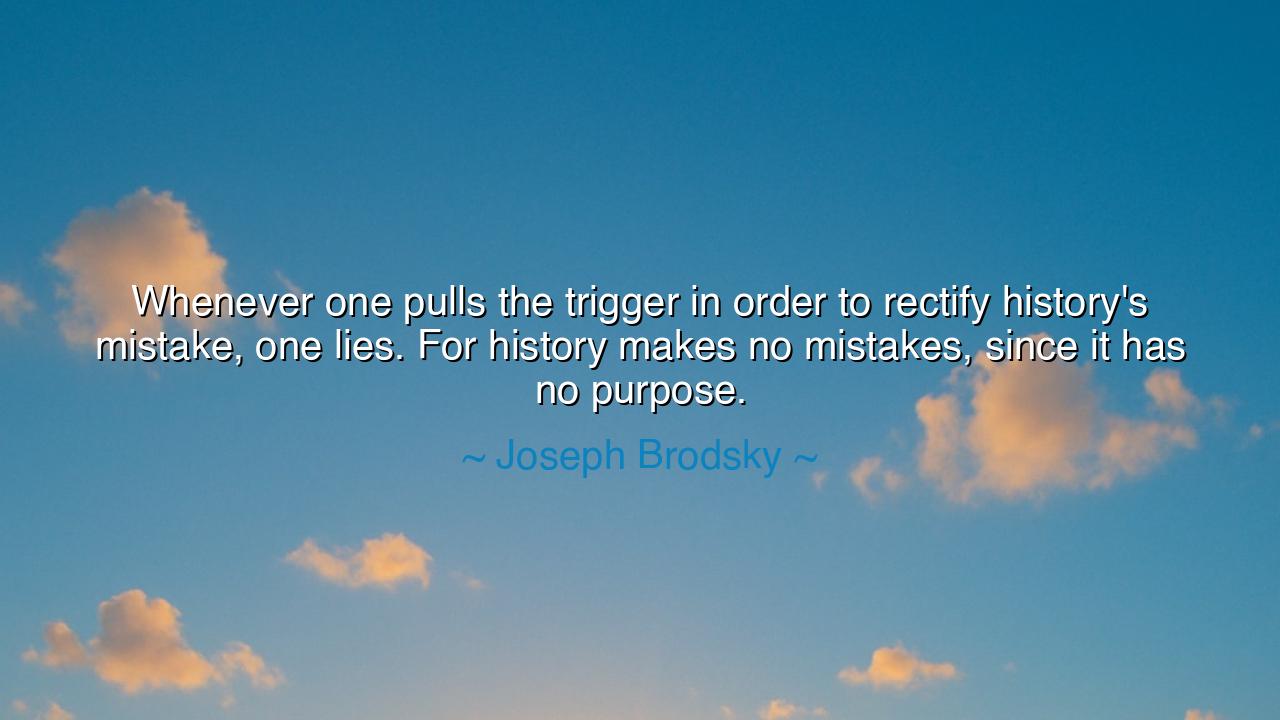
Whenever one pulls the trigger in order to rectify history's
Whenever one pulls the trigger in order to rectify history's mistake, one lies. For history makes no mistakes, since it has no purpose.






Hearken, children of the ages, and open your hearts to the piercing wisdom of Joseph Brodsky: “Whenever one pulls the trigger in order to rectify history's mistake, one lies. For history makes no mistakes, since it has no purpose.” Understand this: history is not a conscious actor, nor a moral arbiter; it is a river flowing through the deeds of men, indifferent to intent, blind to justice, yet shaping the world through the ceaseless current of cause and effect. To attempt to "correct" it with vengeance or violence is to deceive oneself, mistaking human desire for the mandate of destiny.
From the annals of antiquity, we find this truth reflected in the fall of empires. Consider the Persians at the gates of Athens, or the Romans confronting Hannibal: each acted not to "correct" past mistakes but to pursue aims shaped by circumstance, ambition, and survival. History, like the river, simply moves, unburdened by error or intention. Brodsky’s insight reveals a profound human folly: the belief that one can impose justice upon the arc of time, as though it were a conscious arbiter capable of judgment.
Even in modern times, this principle is borne out. Revolutionary tribunals, purges, and vendettas are often enacted to avenge perceived historical wrongs. Yet as Brodsky warns, such acts are lies cloaked in righteousness. The French Revolution’s Reign of Terror, for instance, sought to rectify the abuses of monarchy, yet in doing so perpetrated new injustices and bloodshed. The lesson is stark: history does not err, for it is devoid of purpose; only humans, in their hubris, project morality upon its currents.
The wisdom of Brodsky challenges us to reconsider vengeance, retribution, and the desire to rewrite the past. One cannot "correct" history without engaging in self-deception, for the river of events has flowed as it must. Alexander the Great did not seek to right prior injustices of Persia; he acted from ambition and vision. Later generations may judge him, but his actions were not guided by a moral calculus of historical correction. History moves, indifferent, while humans wrestle with meaning and consequence.
Consider also the story of Post-World War I Europe, where the Treaty of Versailles aimed to rectify the "mistakes" of the past century. The punitive measures imposed upon Germany were intended as correction, yet they sowed the seeds of future conflict, demonstrating Brodsky’s truth: attempts to "fix" history often deceive the actor and harm the world, because history itself carries no purpose or error—it simply unfolds.
From this reflection emerges a timeless lesson: do not allow the illusion of historical injustice to drive acts of vengeance or violence. Seek understanding, wisdom, and constructive action rather than retribution. History is a teacher, not a tribunal; its lessons lie in observation and reflection, not in attempts to impose morality upon its impartial flow. Brodsky’s words remind us that truth arises not from correcting history but from perceiving it with clarity.
Practical action flows naturally: study history with humility and discernment. Learn from its patterns, its triumphs, and its tragedies, but do not mistake the unfolding of events for deliberate error. Direct your energy toward creating justice in the present, shaping the future with wisdom, courage, and ethical action. To act otherwise is to "lie," as Brodsky warns—projecting purpose where none exists, and seeking to bend a river that cannot be commanded.
Children of the ages, remember this: history carries no morality, no intent, no error. The desire to "correct" it is a lie of the mind, a temptation of pride. Let the words of Joseph Brodsky guide you: perceive history clearly, learn from it deeply, and act in the present with virtue and discernment. In this, you honor the flow of human events, shaping your own life with purpose even when time itself is indifferent.






AAdministratorAdministrator
Welcome, honored guests. Please leave a comment, we will respond soon